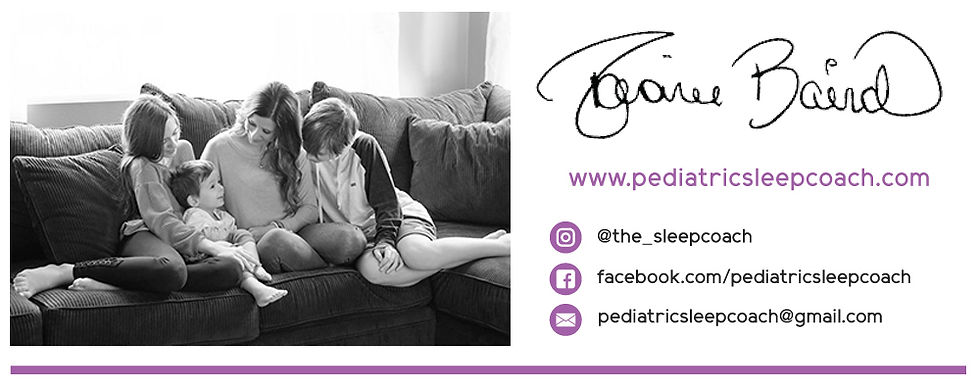Why Won’t My Baby Nap? Here’s What Might Be Going On
- Desiree Baird
- Dec 31, 2024
- 4 min read

I get it. If you're a parent, you’ve probably asked yourself this question at some point: "Why won't my baby nap?" It’s one of those questions that seems simple, but the answer can actually vary a lot depending on your little one’s habits, routines, and stage of development.
More often than not, when parents ask me why their baby isn’t napping, they’re really asking, “Why won’t my baby nap well?” So today, I want to help you figure out what might be going on and what you can do to get those naps on track.
The first question: Can your baby fall asleep on their own?
One of the most common reasons babies have trouble napping is that they haven’t yet learned how to fall asleep independently. And by that, I mean they can:
- Go to sleep completely awake
- Lie down on their back (safely in their crib!)
- Be in a calm, quiet space (no swaddles, pacifiers, weighted sleep sacks or any other fancy sleep props)
- Fall asleep on their own without needing to be rocked, nursed, or bounced
If your baby needs help getting to sleep in any of these ways, they haven’t quite mastered this skill yet. And the tricky thing is—when babies fall asleep with help, they wake up from their nap and realize they’re not in the same place or position. This can cause them to get upset or have trouble getting back to sleep. It’s a little like if you woke up in a completely different room in the middle of the night—wouldn't you be confused too?
If your baby is under 6 months, needing a little help to fall asleep is COMPLETELY normal. But once they start getting older, they may begin to struggle with napping (and even night sleep) if they’re still reliant on you to help them fall asleep. This is because babies often wake up during sleep cycles, and if they don’t know how to fall asleep independently, they may cry out for help or need you to come in and assist them.

Short Naps – Is this a phase, a regression or something more?
If your little one is under 7 months, you’re probably familiar with those short 20-30 minute naps that feel like a tease. It’s frustrating, I know! The good news is that short naps are pretty common at this stage. However, if your baby has learned how to fall asleep on their own, they’re much more likely to go back to sleep if they wake up early from a nap.
Let’s say your baby takes a 30-minute nap but wakes up feeling a bit fussy. If they can self-soothe, they might just drift back off to sleep after a little while—without you needing to jump in and rock them back to sleep. But if they rely on you to fall asleep, they may get upset when they wake and feel like they can’t get back to sleep on their own.
Also, babies who can fall asleep on their own are usually better at handling those night wakings too. Everyone wakes up a little bit during sleep transitions—it’s totally normal. But babies who know how to fall asleep independently can usually go right back to sleep without needing extra help, which means better, more restful sleep for everyone.
I know it’s easier said than done, especially when you’re sleep-deprived and in the middle of a nap struggle. But trust me, it is possible! If you're unsure of where to start, you can hire me to help guide you through getting your baby (18 weeks and older) to fall asleep on their own, nap longer, and sleep better at night. Just fill out this form to schedule a FREE 30 min discovery call so I can learn more about your sleep goals and then you will be one step closer to solving your nap mystery.
Sleep Training: A little help goes a long way
When it comes to naps, the real issue often boils down to your baby not being able to fall asleep independently. This doesn’t mean you need to leave your baby to “cry it out” or abandon them in any way. It just means helping them gently learn how to self-soothe and fall asleep on their own, with the right strategies.
There are definitely other things that could be affecting your baby’s naps, like their sleep environment, how many naps they’re taking, or even their feeding schedule. But if they still rely on you to fall asleep for naps or bedtime, no matter how perfect the room or the schedule is, they’ll likely continue to struggle with short naps and disrupted nights.
The good news? Sleep training can work wonders for everyone in the family. Babies with all kinds of temperaments can learn to sleep better with the right, gentle approach. And it doesn’t have to be a long, drawn-out process. With a little consistency and support, you’ll see big improvements in just a few days or weeks.
You Can Do This!
I know that getting your baby’s naps on track might feel overwhelming right now, but it really is possible. The key is helping them learn how to fall asleep on their own—and once they do, you’ll both be much happier! Healthy sleep for your baby—and for you—is closer than you think.
So don’t give up! Whether you’re just starting to think about sleep training or you’ve already tried a few things, know that there’s help available and you’re not alone in this. With a little guidance and a few simple tools, better naps (and better sleep!) are just around the corner.
Need help with naps, or something else related to improving your little one's sleep? Reach out to me today by filling out this form: Contact Me. Happy snoozing! 🌙✨





Comments